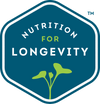Not All Carbs are Created Equal
You may have seen wild pronouncements about carbohydrate (carb) restriction on ketogenic diets, such as “You must keep carbs below 25 grams per day,” or “A zero carb diet prevents Alzheimer’s.” Nothing can be further from the truth with KetoFLEX ™ 12/3 — the only diet clinically shown to improve cognition in the early stages of Alzheimer’s disease when practiced as a part of the overall Bredesen Protocol®.
First, not all carbs are created equal. Complex carbs contain longer chains of sugar molecules than simple carbs, which means they take longer to break down and provide more lasting energy. This means that non-starchy vegetables (like dark leafy greens), are not only nutrient-dense, but they provide small amounts of complex carbs! Second, because we’re addressing a disease process that has previously been intractable, we’re pulling out all the stops and even replacing the carbohydrates from grains with carbohydrates from vegetables to benefit from their wide array of phytonutrients.
On KetoFLEX 12/3, the consumption of non-starchy vegetables from every color of the rainbow along with healthy fats (like high polyphenol extra virgin olive oil) is freely encouraged. In fact, you’ll notice that the second level of the Brain Food Pyramid, entitled “Freely Indulge”, features both food groups.

Research shows that vegetables have a wide array of health benefits, including antioxidant, anti-inflammatory, antiviral, and antibacterial properties. They’ve been shown to upregulate “good” genes, repair cell damage, and improve gut and immune function. Vegetables are rich in phytonutrients, including polyphenols, flavanols, and anthocyanins that have been shown to positively affect brain health. Research has shown that leafy greens can slow the progression of cognitive decline. Any mushroom (from the mighty Lion’s Mane to the humble button) can help to reduce the risk for cognitive decline. Even spices, herbs, and teas, also included in the vegetable category, have neuroprotective benefits. For instance, saffron has been shown to improve cognition, curcumin (found in the spice turmeric) has been found to reduce brain inflammation and beta-amyloid, while a compound found in green tea can break down tau tangles that accompany Alzheimer’s disease.
Your mama told you to eat your veggies. Turns out, she was onto something big. By forgoing empty calories and strategically replacing them with nutrient-dense vegetables and healthy fats, you can use food as medicine and begin to heal yourself as soon as your next meal.


